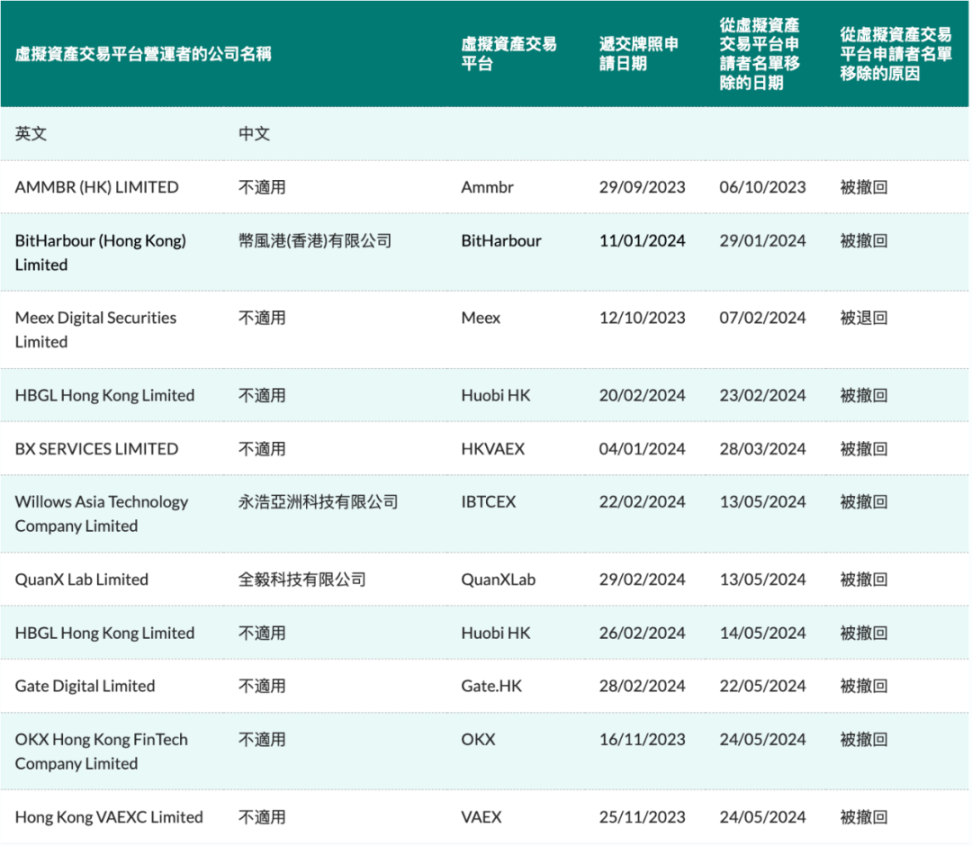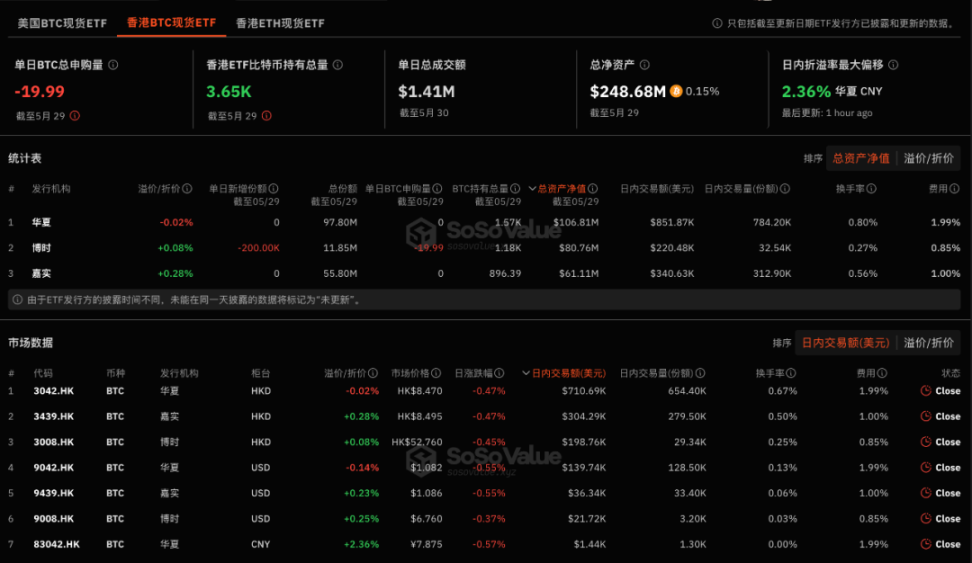Title: The Mainstream Cryptocurrency Exchanges Almost Completely Withdraw from Hong Kong
On February 29, 2024, the Hong Kong Securities and Futures Commission publicly announced that the application period for virtual asset trading platforms had officially ended. According to the transition arrangement by the Hong Kong Securities and Futures Commission, any virtual asset trading platform operating in Hong Kong must either submit a license application to the commission by the deadline of February 29, 2024, or cease its operations in Hong Kong by May 31, 2024.

At one point, a wave of virtual asset trading platforms swept through Hong Kong, with nearly 30 institutions from traditional finance and "crypto-native" entities attempting to take root in Hong Kong's "crypto-friendly" environment.
However, with only one day left until the transition arrangement deadline, we see that the once mainstream "cryptocurrency exchanges" have almost all voluntarily withdrawn. OKX, Gate, Huobi, and even the rumored HKVAEX associated with Binance have all withdrawn their applications. The only ones remaining in Hong Kong are Bybit and Bitget, which acquired the OSL license through investment.

Doubts have arisen. "The Hong Kong government is excluding 'crypto-native' major exchanges," "Hong Kong's regulations are too strict, fundamentally making it the least crypto-friendly in the world"… The once highly anticipated "new generation financial center" has now become a joke in the eyes of some.
Is allowing the U.S. market to continue to dominate the global trend?
The Hong Kong government's unwavering belief in developing a new generation Web 3.0 financial center has never changed and does not need to be questioned. What the market needs is more patience, waiting for gradual changes in the market, seeing compliance and strict development bring positive and sustained results to the industry.
Hong Kong Maintains Firm Determination and Strong Execution
There has never been any basis for doubting Hong Kong's determination to create a crypto-friendly environment. The rapid approval of spot ETFs has exceeded everyone's expectations, serving as the best proof.
Various institutions in Hong Kong had mostly expected the approval of ETFs in the third quarter or the second half of the year. As a result, all parties had been gradually refining operational processes and technical connections. However, unexpectedly in April, the Hong Kong government accelerated the process, forcing all parties to focus on document filing and other work, rendering their original deployment plans incompatible.
The results are clear, data does not lie.

The absolute scale does not look good. With a scale of 250 million USD, it is far from the approximately 57.3 billion USD in the U.S. However, in terms of relative proportions, the 250 million USD Bitcoin spot ETF accounts for 0.5% of the Hong Kong ETF market, while 57.3 billion USD accounts for 0.67% of the U.S. ETF market, showing no significant difference in proportions.
For the Hong Kong virtual asset spot ETF, more time is needed for processes, channels, and technology to be better aligned, which may take several months. The entire virtual market needs more time to achieve comprehensive integration in various aspects.
The Withdrawal of Applications Reflects Rigorous Investor Protection
The Hong Kong government's rapid approval of ETFs aims to attract global capital to focus on Hong Kong through innovative models. The government's goal is clear: to integrate traditional finance with the emerging virtual asset market, which is an important task for the future of the Hong Kong market.
The regulatory principles of the Hong Kong virtual asset market prioritize risk. From many perspectives, the "mainland-based" virtual asset trading platforms have too many uncertainties. For example, in terms of funding, where does the capital behind the trading platforms come from? Can it be within the jurisdiction of the Hong Kong government? Long-standing issues in Web 3.0 systems are also difficult to resolve. For instance, almost every platform has issued platform tokens. Should these "tokens" be within the jurisdiction? How should the risks be managed?
Applicants entering the Hong Kong market from the "crypto-native world" bring many issues that cannot be resolved within the current regulatory framework. Faced with these critical issues, the Hong Kong government has made the best "compromise" choice. The wave of withdrawals by applicants is the result of communication and negotiation, which is fundamentally different from the hardline approach of "rejection" and "expulsion." In comparison, Hong Kong has left ample space and potential for future cooperation with these "crypto-native residents."
The author believes that Hong Kong will continue to seek more opportunities for cooperation with these "crypto-native residents" in the future. Hong Kong will not willingly be forever labeled as a "vassal" of U.S. finance. Virtual assets present a rare opportunity that must be seized.
The U.S. Attitude Toward Virtual Assets Is Far Worse Than Hong Kong's
Due to the close ties between Hong Kong's financial market and the U.S. market, investors generally compare the Hong Kong market with the U.S. market to assess the strengths and weaknesses of the Hong Kong virtual asset market. However, fundamentally, the U.S. government still regards virtual assets as one of its political tools, and the destructive impact of this uncertainty is far more terrifying than Hong Kong's strictness.
A few examples illustrate the unpredictability of U.S. regulation. On May 24, 2024, the U.S. SEC suddenly approved the 19b-4s documents for all Ethereum spot ETFs, giving the green light to the pending Ethereum spot ETF trading. Previously, various institutions had not anticipated any progress in the approval of Ethereum spot ETFs. At the Consensus 2024 conference, Ark Invest CEO Cathie Wood admitted, "We originally thought it wouldn't be approved, absolutely not. According to the usual process, if it were approved, we would have received inquiries from the SEC. But strangely, we did not receive any inquiries from the SEC before this approval."
What is the reason behind the sudden change in the direction of the U.S. SEC? It cannot be denied that this change fundamentally may have been a political show staged for this year's election results.
Trump's competitor, former U.S. President Trump, has explicitly stated his acceptance of cryptocurrency as a form of presidential campaign donation. "Biden's lack of understanding of cryptocurrency" has also become a focal point of attack, implying that cryptocurrency will become a point of contention in the election. Caixin also reported that in the election year, the "cryptocurrency community" in the U.S. has become a political bargaining chip. To prevent Trump from winning over this community, Biden's attitude toward cryptocurrency may undergo a significant change.
The result has indeed been as such. Almost like a joke, the SEC swiftly approved the crucial steps for Ethereum spot ETFs. If it were delayed until after the election, could the SEC change its stance again and directly veto the subsequent steps for Ethereum spot ETFs?
Even today, the development of the virtual asset market is still a game of political maneuvering by U.S. authorities. In comparison, the regulatory framework in the Hong Kong market, even if it is "strict" and "unprofitable," is based on stable conditions with clear rules. The virtual asset industry has already reached a bottleneck after more than a decade of development, and it is almost impossible to expect to overtake from the "crypto-native" community. Hong Kong's hope is for internationally renowned institutions to recognize this land and bring more innovative changes from the perspective of traditional finance, which will undoubtedly require years of cultivation from various aspects.
Hong Kong is one of the best sandboxes for the development of Web 3.0
Just yesterday, on May 30, Academician of the Chinese Academy of Engineering and Professor at the School of Computer Science and Technology of Zhejiang University, Chen Chun, was invited to the Hong Kong Legislative Council to exchange views with members of the Legislative Council on relevant issues.
During the exchange, Chen Chun stated, "The rapid development of digital technologies represented by big data, artificial intelligence, blockchain, the internet or mobile internet, and the Internet of Things has given rise to a new economic model called 'digital economy.' The 'digital economy' is becoming a key force in restructuring global factor resources, reshaping the global economic structure, and changing the global competitive landscape."
"Based on Hong Kong's technological infrastructure and unique advantages, the development of Web 3.0 should prioritize serving the real economy, promoting innovative applications, such as digitizing traditional finance and physical assets, developing digital asset businesses with tokenization of real assets as the core, increasing asset liquidity, reducing transaction costs, and enhancing transparency, enabling Hong Kong to occupy a position as a digital financial center in the new round of international competition."
"Web 3.0 is not simply about 'virtual currency,' but about studying how to promote the real economy. Hong Kong has great advantages and a sound legal framework. The development of virtual currencies in the market is like a 'wild rush,' but Hong Kong is a 'big sandbox' where risks need to be considered, and clear boundaries need to be managed so that the causes of negative events can be identified. Hong Kong aims to form a unique ecosystem through its financial attributes and traditional service industry, and is believed to play a significant role in the development of China's digital economy."
The views and statements from mainland Chinese professionals have long been looked down upon by the "insiders." However, this time, the academician of the Chinese Academy of Engineering has spoken out, representing to a certain extent the positioning and views of mainland China on Hong Kong: Hong Kong is a cautious experimental field, where risk control is paramount. The key issue is how to transition from traditional to Web 3.0, given the incomplete infrastructure in Hong Kong.
No one can definitively say whether this strategy is correct, but clearly, compared to the rampant growth in the U.S. market, Hong Kong undoubtedly needs more time to see results. Over time, when Hong Kong's virtual asset trading platforms successfully enter from the perspective of real-world assets, a diversified range of new asset categories will become the best support for the Hong Kong market, as well as the fundamental basis for Hong Kong's challenge against the U.S.
At the very least, it is not yet time to give up on the Hong Kong market. Just because the start is not good, why must it necessarily end in defeat?
免责声明:本文章仅代表作者个人观点,不代表本平台的立场和观点。本文章仅供信息分享,不构成对任何人的任何投资建议。用户与作者之间的任何争议,与本平台无关。如网页中刊载的文章或图片涉及侵权,请提供相关的权利证明和身份证明发送邮件到support@aicoin.com,本平台相关工作人员将会进行核查。




